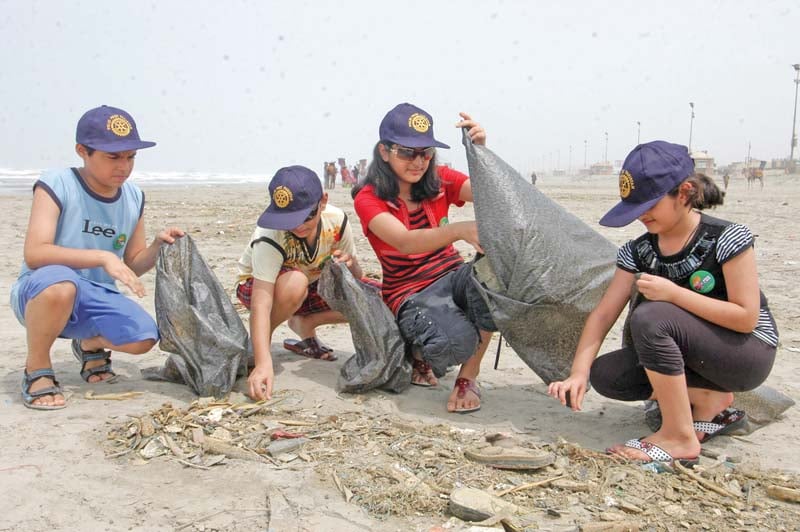
Ramzan Ali, now a postgraduate student in the UK, conducted this research in 2013 as part of his final year thesis. "Plastic debris is among the 10 biggest environmental issues in the world. There is no prior reference for this research either locally or on the Indian side," said assistant professor, Zafar Iqbal Shams, under whose supervision the research was conducted. "The Karachi beach is not in good condition, which is why it was decided to conduct this research."
The study that spanned a period of three months, from June to August, revealed that an average of 54.83 kilogrammes (kg) per kilometre of waste was found on the five kilometres (km) of designated seashore land. Plastic is on the high end of all the debris, followed by food at 7.5 per cent and paper at 6.5 per cent.
Read: National flag to fly high at Karachi's Sea View beach
"June to August was chosen because this is the time of the year when the beach is most visited by the public. Hard summers and the monsoon attract larger numbers of people than ordinary," explained Ali.
The results of the survey revealed that the average weight of debris in June was estimated to be 50.7kg per km in June, 64.7kg in July and 49.1kg in August. "The rising pattern gradually started from the end of June and remained till the end of July, dropping down slowly in August, because from June people start visiting the beach. Therefore, the amount of waste produced is quite less. In July, the numbers go higher because a high number of people visit the beach every day. When the summer ends the number of people also reduce and less debris is produced," Ali explained.

With regards to the implications of the high presence of plastic, a non-biodegradable material, Professor Shams said it is a hazard, not only for marine life and their habitat, but also impacts the food chain cycle, which ultimately affects humans. "The thing with other debris like food, cloth and processed wood is that they are eventually eliminated from water. Since plastic doesn't decompose, it remains intact and travels in the water to other countries," he said.
The study attributes human-induced sources as the major contributors to seashore debris. Apart from floating materials in Lyari and Malir, it goes on to say that there are a few instances of natural contamination as compared to the ones done by beach-goers.
Read: Nearly 180 insurance workers clean up Sea View
"There were very few or none non-human induced sources of debris, such as masonry items, which can come on the beach through another source," said Ali.
Read:
Ali and Professor Shams are of the view that plastic reduction is the only plausible solution to this problem. "In instances where plastics cannot be replaced, efforts should be made for its recycling," said Shams. While Ali says that there is a need to strengthen the beach debris management system and ensure that the beach is cleaned regularly.
Published in The Express Tribune, September 21st, 2015.

1726728390-0/BeFunky-collage-(7)1726728390-0-165x106.webp)
1728297472-0/Fousey-(1)1728297472-0-165x106.webp)

1730806672-0/diddy-(37)1730806672-0-165x106.webp)
1731746071-0/Untitled-design-(11)1731746071-0-270x192.webp)
1731749026-0/Copy-of-Untitled-(3)1731749026-0-270x192.webp)

1731737597-0/Untitled-design-(12)1731737597-0-270x192.webp)








COMMENTS (5)
Comments are moderated and generally will be posted if they are on-topic and not abusive.
For more information, please see our Comments FAQ